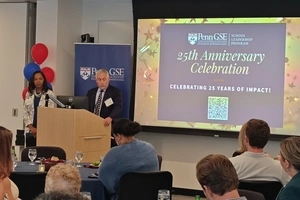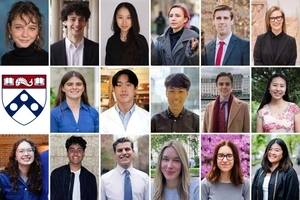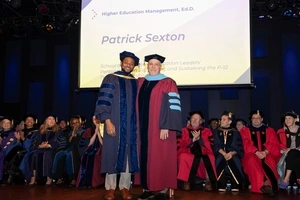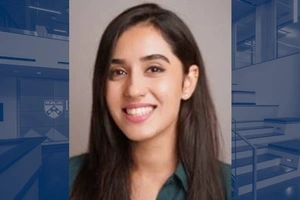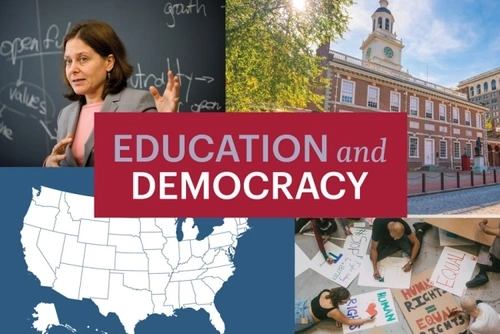
Photos by Ginger Fox, iStock.com/f11photo, Maskot/Maskot/Getty Images, iStock.com/Andrii Tokarchuk
This story originally appeared in the Fall 2021 print edition of The Penn GSE Magazine.
by Juliana Rosati
What do young people need to learn to become informed, active citizens who can engage productively with those whose views differ from their own? What approaches can foster this learning?
Along with related subjects such as history and social studies, civics has generally been deemphasized in U.S. schools in recent decades as standards and testing have focused on math, writing, and reading. Now, as an era of political polarization, a historic civil rights movement, and the wake of the January 6 insurrection fuel urgent questions about the state of American democracy, increased attention has come to the role of education in imparting the ideals of civic life. Recently, teaching in an era of constitutional crisis was the topic of the Steven S. Goldberg and Jolley Bruce Christman Lecture in Education Law, given at Penn by best-selling author Dr. Jill Lepore.
Penn GSE faculty, students, and alumni have long been exploring and strengthening the ways that education can prepare students to understand and exercise their rights and responsibilities as citizens of a nation governed by the people. The Spring 2021 issue of The Penn GSE Magazine offered a glimpse of how Penn GSE alumni are educating and nurturing the next generation of citizens through their teaching and leadership. Here, we focus on the contributions of Penn GSE faculty and students in the areas of civic dialogue, classroom practices and curricula, and learning beyond the classroom.
“I am proud of the ways in which our faculty and students are creating opportunities to learn about democracy and engage in deliberation,” says Penn GSE Dean Pam Grossman. “This work is essential to our future, as our country grapples with deep divisions during a time of constitutional crisis.”
Examining Freedom, Voice, and Dialogue
Education for citizenship in a democracy must involve opportunities for students to develop their voices while engaging with perspectives different from their own, according to Professors Sigal Ben-Porath and Jonathan Zimmerman, both of Penn GSE’s Literacy, Culture, and International Education division. Each has produced decades of scholarship relevant to the current moment. Dr. Ben-Porath examines the subject from a philosophical perspective, while Dr. Zimmerman considers it from a historical one.
“As a democratic citizen, you ought to be able to develop, change, and express your opinions,” says Ben-Porath, whose work focuses on how educational institutions can sustain and advance democracy. In Free Speech on Campus, published in 2017 by University of Pennsylvania Press, she responds to controversies in which inclusion and freedom of speech are characterized as opposing values. For instance, arguments have been made about whether colleges should promote free speech by hosting a speaker with views that are offensive to some constituencies, or promote inclusion by banning the speaker. Ben-Porath sees this approach as a false dichotomy that distracts from a larger picture.
“I see freedom of speech and inclusion as not actually juxtaposed, but as mutually reinforcing,” she says. Ben-Porath proposes that institutions should focus on creating “inclusive freedom”—conditions in which freedom of speech and inclusion go hand in hand. “What is key is not just the formal regulation of speech that preserves the possibility for people to speak,” she says. “What matters in K–12 and higher education is that people, in fact, are speaking and listening to each other.”
How to create such conditions is a complex question. Zimmerman, whose work examines how educational practices and policies have developed over time, is troubled by evidence that many individuals may be choosing not to express their views. He points to survey results such as those of the Foundation for Individual Rights in Education.
“Across political parties, both students and faculty are reporting that they’re not raising their voices,” says Zimmerman, who is the Judy and Howard Berkowitz Professor in Education. “I think the biggest inhibitor now on all kinds of education is self-censorship.” Zimmerman calls for educational institutions to model exchange across difference. For example, an initiative he and Penn GSE’s Dr. Harris Sokoloff created after the 2016 election brought together students from Penn and Cairn University, a Christian institution near Philadelphia, for conversations that began with the prompt, “Tell me who you voted for and why.”
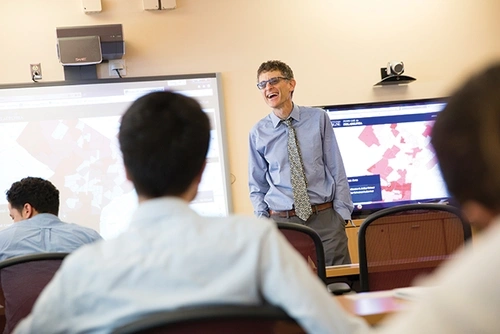
College, however, is too late to begin fostering respectful dialogue, according to Zimmerman; students may already have spent years “watching people screaming at each other on cable TV and thinking that’s what politics is.” He envisions exchange beginning at the earliest grades, with predominantly “blue” communities hosting classroom speakers with “red” views, and vice versa. “If there is going to be an answer to polarization, it has to start in our public schools,” he says. “That’s our major public institution for schooling our young and for making citizens.”
Ben-Porath sees in the current landscape an opportunity to rebuild trust. “The environment is a challenging context for education for citizenship, but also a very clarifying one in terms of the need to engage in conversations across ideological and other differences, so that people learn again to trust each other,” she says.
Fostering Discussion and Exchange in the Classroom
Ben-Porath says class discussions—whether in civics, history, social studies, or another subject altogether—are vital to helping students practice and develop their voices as citizens, both in K–12 and higher education. “It’s important to preserve some class time for discussion and collaboration, for students to try out ideas and make the best argument that they can for different positions,” she says. Penn GSE faculty and students are advancing discussion in the classroom through innovative approaches and curricula.
Discussion is a prominent part of the award-winning “Reading Like a Historian” curriculum, which Penn GSE Associate Professor Abby Reisman helped develop to foster critical thinking in history and social studies classes. Through “document-based” inquiries, students read multiple perspectives on a single event, use them to investigate a central question posed by the teacher, and share their reasoning with the class.
“In a traditional classroom, historical knowledge exists in fixed narratives held by the teacher and the textbook. In an inquiry classroom, students construct the knowledge,” says Dr. Reisman. For example, a lesson on the Battle of Little Bighorn asks students to analyze accounts that depict the 1876 event differently. The goal is for students to be able to answer not only “What happened?” but also “How do you know?” and “Why do you believe your interpretation is valid?”
Because the skills of facilitating such discussions are complex, and professional development specifically for social studies teachers is rare, Reisman’s current research focuses on how to help social studies teachers learn to lead productive discussions. “Often, teachers have to rethink their role—to make teaching a space of listening and connecting rather than of monologue,” says Lightning Jay, a doctoral candidate in Penn GSE’s Teaching, Learning, and Leadership program, who has contributed to Reisman’s research.
Reisman and colleagues are studying the learning of novice social studies teachers in Philadelphia schools with a $2.46 million grant from the James S. McDonnell Foundation. Reisman is also working with a school district in Virginia with support from the Spencer Foundation to create a coaching program in document-based history instruction, a project with the potential to produce a scalable model of professional development. Aware that historical material pertaining to race can easily bring up students’ responses to current events, Reisman, Jay, and Lisettte Enumah, GR’19, developed a framework to help teachers navigate such moments, published in Theory & Research in Social Education (Volume 48, 2020).
The stakes of discussing race and other charged topics in the classroom have dramatically increased in recent times, with laws in many states banning teachers from taking on material including the 1619 Project and critical race theory. The trend threatens teachers’ ability to prepare students effectively for civic life, according to Zimmerman. In The Case for Contention: Teaching Controversial Issues in American Schools (The University of Chicago Press, 2017), he and coauthor Emily Robertson advocate for teachers to tackle hot-button issues so that students can learn to discuss them respectfully. “In case you haven’t gotten the memo, Americans disagree about America. The problem is we still don’t have a consensus about addressing those disagreements in our schools,” says Zimmerman.
“The continuity of our nation depends upon each generation’s capacity to further the idealsof a democratic society,” says Penn GSE Dean Pam Grossman. “At Penn GSE, we are strengthening the future of our nation through our efforts to prepare young people to engage in democratic deliberation and civic participation.”
The 2020 election and a course taught by Zimmerman prompted Elizabeth Reynolds, GED’21, to research how teachers discuss politics in the classroom for a project she undertook as a student in Penn GSE’s Teaching, Learning, and Leadership program. “Often teachers simply don’t talk about controversial issues—for lots of reasons, including not having the support or pedagogical tools to do so,” she says. Now enrolled in a doctoral program at the University of Maryland, Reynolds is working to develop such tools. At the same time, she says, teacher preparation is only part of the solution. “There also needs to be a commitment on the part of communities to the messiness that is teaching for democracy and deliberation,” she says.
Support for teachers to address a host of sensitive issues and often-marginalized perspectives is the core of “Teaching beyond September 11,” a new curriculum about the years from 2001 to 2021, developed by Penn GSE Senior Lecturer Ameena Ghaffar-Kucher with support from the Penn Global Engagement Fund, Penn GSE, the Penn Libraries, Penn’s Middle East Center, and Penn’s South Asia Center. From the human costs of the Iraq and Afghan wars, to the impact of security measures on civil liberties, to the rise of anti-Muslim sentiment in both media and policies, the topics of the twenty modules are complex and challenging. “September 11 was an awful day. But what is never talked about in schools is the aftermath,” says Dr. Ghaffar-Kucher, whose work is also exploring civic engagement among American youth from Muslim immigrant communities in the years since September 11, 2001.
As an Afghan-American and a former New York City public school teacher, Madina Wahab, GED’20, appreciates both the curriculum’s content and the fact that its authors are members of Muslim communities and people of color. “I think it’s really important to be teaching about the aftermath of September 11 in a way that is nuanced, in a way that is complex, and in a way that highlights voices of Muslims,” says Wahab, who contributed to the curriculum. A graduate of Penn GSE’s International Educational Development Program, she is now a curriculum development associate at Girl Up, a United Nations Foundation program.
Engaging beyond the Classroom
Powerful experience in citizenship and democracy can happen when students engage and raise their voices outside the classroom through community involvement and extracurricular activities. Ben-Porath sees this as an area of recent growth in K–12 and higher education. “Education for citizenship is becoming more robust outside of the classroom in pedagogical practices and in the steps that young people are taking,” she says. Penn GSE faculty and students are advancing this kind of learning through innovative opportunities.
Learning by effecting change is the topic of research by doctoral student Abigail Dym. “When people are actively working on a problem that they think matters in their environment or to their community, they are able to make change in the world and often learn deeply about themselves and their community in the process,” says Dym, who is pursuing a joint degree in education and political science at Penn GSE and Penn Arts and Sciences, with Ben-Porath as her advisor.
Dym’s research is exploring how student-driven learning with a local emphasis could increase students’ political knowledge and motivation to be civically engaged. In focus groups that she led, Philadelphia high school students voiced an interest in learning about local elections, saying that these may have a bigger impact on their daily lives than presidential races, but are rarely discussed in school. “My hope is to co-create knowledge about politics with young people in ways that are locally and personally relevant,” she says.
Dym recently applied this approach to support a Penn undergraduate course in election politics and law taught by Associate Professor Marc Meredith. As a 2020–2022 Provost’s Graduate Academic Engagement Fellow for Penn’s Netter Center for Community Partnerships, Dym adapted the course into the Netter Center’s Academically Based Community Service (ABCS) format, which engages students in real-world problem solving on campus and in the local community.
[[image|right|caption=Penn GSE’s Dr. Ameena Ghaffar-Kucher, senior lecturer and director of the International Educational Development Program, creates curricula that support teachers in addressing sensitive issues and often- marginalized perspectives. Photo by Penn GSE|alt=A lecturer wearing a light green colored blouse addresses a classroom of diverse students seated around round tables. The title of the digital presentation in the background reads “Understanding “Literacy” |width=400|src=/sites/default/files/penngse_education_democracy_ghaffar_kucher_classroom.jpg]]
Students identified an issue to address—how to simplify the process of voting for undergraduates on campus—and partnered with the student organization Penn Leads the Vote as well as the Office of the Philadelphia City Commissioners to conduct research.
Graduate-level opportunities to collaborate with community organizations are the basis of another ABCS course, “Activism beyond the Classroom,” developed by Penn GSE Assistant Professor Krystal Strong. “I wanted to create a classroom that could be a bridge between the campus and local communities and movements,” says Dr. Strong. In a recent iteration of the course, students engaged with local teacher organizing, as well as efforts by communities and youth of color to reclaim and memorialize particular city sites. “The class tends to attract people who want to make change in the world as educators or simply as human beings,” says Strong. “This class is not giving them a blueprint, but it is really seriously thinking about the praxis of effecting change.”
Much of the course content is student-driven, and multimedia resources created by students have brought visitors from around the world to the course website. “Producing podcasts, writing editorials, and contributing to the social media account for the class—all of those things really put into practice the idea of building a bridge between academia and communities,” says Rehana Odendaal, a doctoral student in Penn GSE’s Education, Culture, and Society program who is assisting with Strong’s research on youth leadership in Africa. Jimil Ataman, GED’18, another doctoral student in the program who took the course, drew inspiration from it for her dissertation about learning among U.S. consumer activists. “I really appreciated learning about the many forms that activism can take,” says Ataman, who is contributing to Strong’s research on student movements in Africa.
Extracurricular activities can also offer valuable opportunities for civic learning outside of the classroom. To bring a mission of building “the virtues central to democratic citizenship” to students in Philadelphia schools, Dustin Webster, a doctoral student in Penn GSE’s Education, Culture, and Society program, initiated a Philadelphia regional competition of the National High School Ethics Bowl. Teams are rewarded not for arguing a single position, but for presenting multiple positions in response to an ethical question and collaborating with their competitors. Local students take part annually in the Philadelphia competition, based at Penn, and the winning team goes on to compete nationally. “Students are working together to learn and understand. That requires and develops traits that are very important for civic life in general—intellectual humility, open-mindedness, civic trust,” says Webster, who has studied with both Ben-Porath and Zimmerman.
For Penn GSE, perhaps the greatest source of hope for democracy and civic life is the School’s students, who are becoming the transformative educators, scholars, and leaders that the nation and world need.
“The continuity of our nation depends upon each generation’s capacity to further the ideals of a democratic society,” says Dean Pam Grossman. “At Penn GSE, we are strengthening the future of our nation through our efforts to prepare young people to engage in democratic deliberation and civic participation.”





